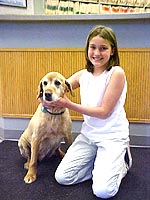Senior Care
 Enjoying the Golden Years; Important tips for your older pet.
Enjoying the Golden Years; Important tips for your older pet.
If you haven’t already, soon you may begin to notice the telltale signs that your pet is entering the "senior" years. Maybe your dog takes longer to fetch a favorite ball. Maybe your cat stops greeting you at the door or takes longer to get there. Maybe your dog is forgetting housetraining. Perhaps you’re noticing that your dog is gaining weight, has poor skin and coat condition or is sleeping more than usual. Your special, old cat may be losing weight or drinking excess water. While these things may seem like normal "old age" to you, the fact is many of these signs may indicate that your senior pet has a medical problem that needs attention. In the past, we often accepted a declining quality of life for our aging pets as a fact of life beyond our control. Thanks to advances in disease detection and treatment, that is no longer necessary!
With appropriate veterinary care and nutrition, your pet’s senior years can be healthy and happy. You are the key to making this happen. You know your pet better than anyone so it’s up to you to report any changes to your veterinarian. Physical exams and diagnostic testing are very important as your pet ages. Remember: your dog ages 5 to 7 years for every one of yours. This suggests that health problems in your pet can progress 5 to 7 times faster. More frequent checkups are therefore necessary.
While some signs of aging, such as a graying muzzle and slowed activity are easy to identify, others are subtle. Most age-related changes in how your pet looks, acts and feels tend to be gradual. Therefore it takes a watchful eye to recognize what may be early signs of disease or health problems. Following is a list of the most common changes associated with age-related diseases and compromising medical conditions. If you note any of these changes in your pet, please let your veterinarian know.
- Weight gain (or loss)
- Changes in appearance (skin and haircoat or muscle tone)
- Changes in eating or drinking habits
- Increased urination
- Increased thirst
- Loss of housetraining
- Limping, stiffness and arthritis
- Coughing or difficulty breathing
- Exercise intolerance
- Vision and hearing loss
- Bad breath (dental disease)
- Nonresolving diarrhea or vomiting
- Less interaction with family
- Disorientation/confusion (getting lost in the house or yard)
- Less responsive to verbal cues or name
- Seizures
- Significant decrease in appetite
Now is also a good time to reassess your pet’s diet. Proper nutrition is an extremely important factor in your senior pet’s health. Dietary needs mirror the changes occurring in the body, metabolism slows and fewer calories are required. Just as we need to alter our diet as we grow older, aging pets should avoid excess weight gain. A properly formulated diet combined with moderate exercise program is powerful preventative medicine for senior pets. The Alexandria Veterinary Clinic PetCare Center is dedicated to caring for your special older pet. The latest technology such as Laser Surgery, X-rays, Blood Chemistry, Urinalysis, Med-RX Imaging System, Nutrition Counseling, Arthritis Management and Dentistry are all techniques used to help our aging pets. Enjoy your pet’s "golden years".